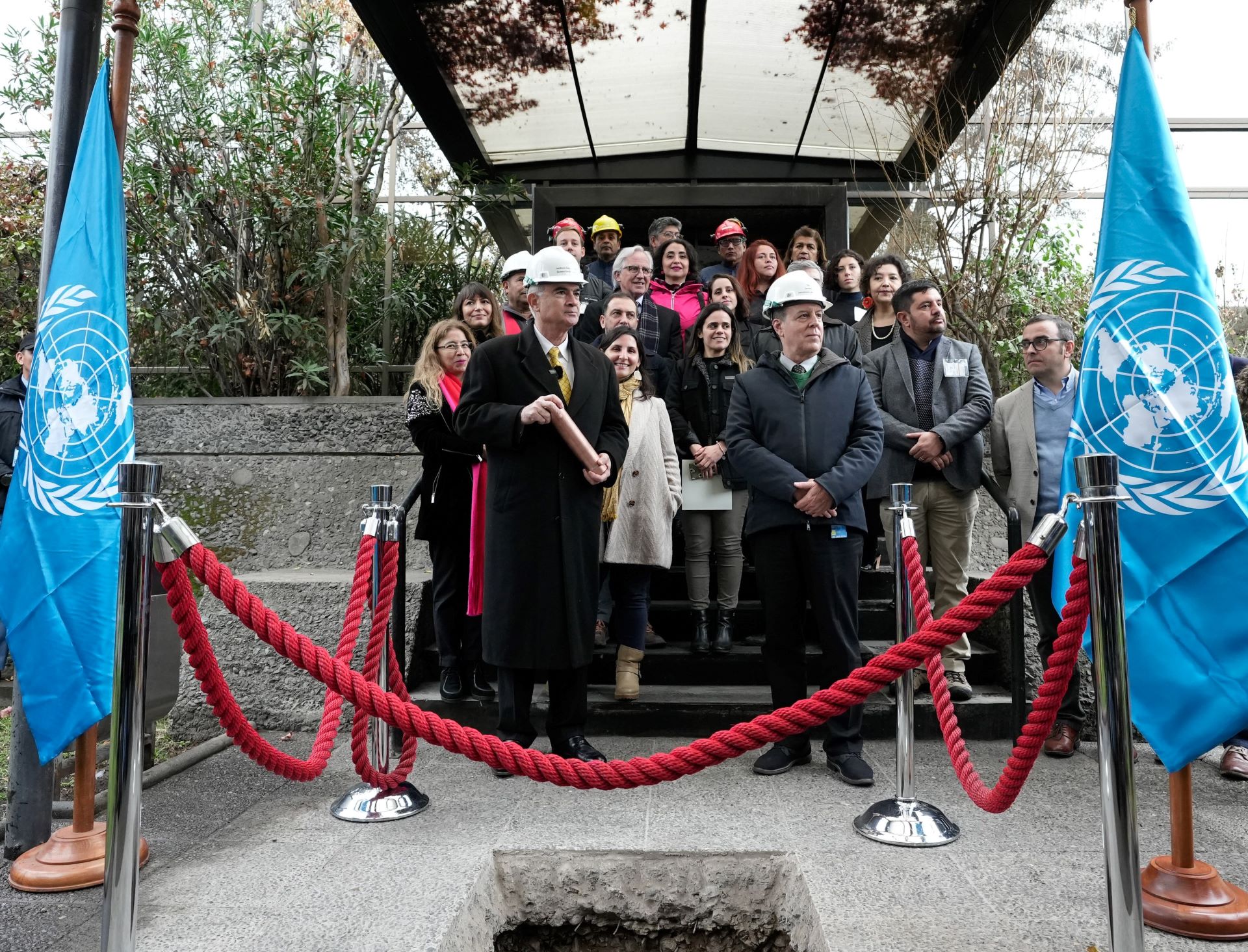ECLAC Starts the Construction and Renovation of a Sustainable, Inclusive Building that Will Prioritize Energy Efficiency and Care for the Environment
Work area(s)
The cornerstone of the new North Building in the compound that houses the Economic Commission for Latin America and the Caribbean in Santiago, Chile was laid on Friday, June 9, 2023.

On Friday, June 9, 2023, the Economic Commission for Latin America and the Caribbean (ECLAC) kicked off the construction and renovation of the North Building of its central headquarters in Santiago, Chile – a structure that will meet high standards of sustainability, inclusion, productivity, transformation, and quality of life and work, which are a true reflection of the values and aspirations of ECLAC, the United Nations and the Sustainable Development Goals.
This new edifice will join the institution’s already renowned main building, which experts consider to be a landmark in Latin American modern architecture and which is one of the main examples of this movement worldwide in the twentieth century.
The ceremony to lay the North Building’s cornerstone was led by the organization’s Executive Secretary, José Manuel Salazar-Xirinachs, who was accompanied by the Commission’s Deputy Executive Secretary for Management and Programme Analysis, Raúl García-Buchaca, and the officials in charge of the project from ECLAC’s Administration Division and the General Services Unit. Also participating were representatives of the private companies in charge of the project’s construction, technical inspection and architecture – L&D, C&D and VAAR & Ipiña-Nieto, respectively – along with officials from the “Construye 2025” program of the Chilean Government’s Corporation for the Promotion of Production (CORFO), the Association of Women in Construction, and ECLAC’s entire staff.
The new building will be one of a kind, since it incorporates various innovations, including saving energy via efficient and automated technology, and also becoming a source of clean energy through the rooftop installation of a 2,600-square-meter photovoltaic plant made up of solar panels that will have an annual power production capacity of approximately 475,888 kWh (kilowatt-hour). This will entail 50% less energy consumption than in the old building and involves a 19% surplus beyond the refurbished North Building’s consumption. Thus, it will be the organization’s first “net zero” building, meaning that it will produce more energy than it consumes.
Furthermore, the project will incorporate special anti-seismic construction techniques that comply with the demanding regulations in force in Chile (a country known for its tendency to suffer high-intensity earthquakes); an interior design that contemplates removing physical barriers that would prevent persons with disabilities from freely making use of work spaces; the cleaning and reuse of 100% of the wastewater for irrigation purposes, along with reducing sanitary waste to a minimum; as well as the use of local sustainable materials that would reduce the project’s carbon footprint, such as: black steel slag in the concrete mix (a byproduct of metallurgical processes, thereby averting the extraction of natural aggregates), recycled steel, insulation made from organic fibers (wood wool), linoleum floors made from renewable materials, and special care in the final disposal of construction waste with the aim of producing the least amount of pollution possible, among other characteristics. All of this tangibly shows the construction market that it is possible to make the leap towards the circular economy.
An arduous and novel bidding process called the Multistage Request for Proposals with competitive dialogue attracted the interest of prominent companies at a local, regional and international level, and benefited from having participants from among the world’s most important construction companies.
“This process included all the mechanisms for ensuring transparency, turnout, and healthy competition among participants. And as a result, today ECLAC is honored to present a very successful example that can be used and replicated by the rest of the United Nations System’s entities,” José Manuel Salazar-Xirinachs indicated at the ceremony.
In fact, on April 14, 2023, the Headquarters Committee on Contracts (HCC) of the United Nations Secretariat in New York congratulated ECLAC and expressed its deep satisfaction with the project’s solicitation process.
“I hope the officials who will labor in this new building will feel certain about having a new home that will foster creativity, collaborative work and the joy of working in facilities with the highest level of innovation in construction, inclusion and sustainability. With this cornerstone, we take another step forward along the path towards a sustainable future for ECLAC’s compound in Santiago,” added the organization’s Executive Secretary, who deposited a copper capsule in the ground with a copy of his remarks and a report summarizing the objectives, methodologies and processes carried out to execute this emblematic project.
Type
Country(ies)
- Latin America and the Caribbean
-
Chile
Contact
Public Information Unit
- prensa@cepal.org
- (56 2) 2210 2040